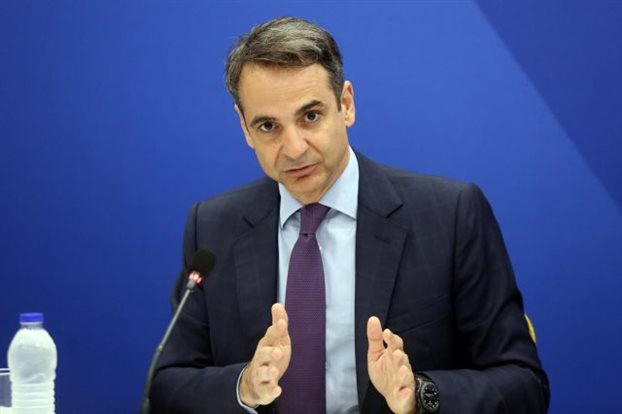
Time is running out — for all of us. Greeks are witnessing this firsthand.
This summer, our country simply burned. Together, we saw the dramatic and devastating effects of global warming, with record-breaking and sustained temperatures above 40 degrees, day after day after day. What followed was an unprecedented environmental catastrophe, with forest fires that swept away precious ecosystems in just a matter of days.
This is not climate change in action, it is a climate crisis in action — a never-before-seen threat to our way of life and our children’s future. And to combat it, we must think big, act fast and lead by example. For if we have the courage to collaborate — at pace, at scale, and starting now — overcoming the financial hurdles, we can salvage opportunity from this crisis.
Greece is a mid-sized European country, a maritime power with 20 percent of the global shipping fleet and a tourism hotspot. We could, of course, just sit back and wait for the big polluters to act — after all, our carbon emissions are comparatively small. But we will not. Even smaller countries like Greece can have a big impact on the world’s global green transition.
Along with eight other EU member countries — Portugal, Spain, France, Italy, Croatia, Cyprus, Malta and Slovenia — Greece recently adopted the Athens Declaration, focused on climate mitigation across the Mediterranean. We have also created a Climate Crisis Ministry and are implementing a 6+1 climate program across Greece: Six initiatives — on shipping, tourism, renewables, decarbonization, green energy interconnection and ecosystems — underpinned by one all-encompassing climate law that will be ratified later this week.
The green transition is, however, a capital-intensive transformation. Greece has thus far succeeded in mobilizing considerable EU funding for climate change mitigation. But it is not enough.
Europe needs more innovative approaches to funding and fundraising at a scale that matches our collective endeavors. If the pandemic taught us anything, it is that when the need is acute, we can finance research and innovation at scale and with incredible results.
Therefore, we must work to support smart infrastructure that is interoperable across borders and is transparent, accessible and consistent with a level playing field when it comes to competition.
Bringing ideas and experiments to life only works when the private sector, governments and investors collaborate. So we must unlock barriers to deploy capital internationally, positively anticipating and supporting the future markets for and the ideas behind green technology and alternative fuels.
This means investment in renewables like offshore wind and R&D projects like the EU’s new research institute for sustainable shipping — where we are supporting the incubation of green tech ideas to cut shipping’s future carbon footprint — and those on the islands of Astypalea and Halki, where we are building 100 percent green and energy-autonomous sustainable tourism destinations with help from Volkswagen and Citroën.
If we can work together, we can build the green industrial revolution of the future. We can engage our citizens and our businesses in the benefits of the green transition.
It is time that we see that halting this crisis is not a cost-increasing burden that compromises economic growth. It is the opposite — a green technology revolution with enormous wealth-generating power and redistributive potential.
Latest News

WTTC: Travel & Tourism to Create 4.5M New Jobs in EU by 2035
This year, international visitor spending is set to reach 573 billion euros, up by more than 11% year-on-year

IMF: US Tariffs Shake Global Economy, Outlook Downbeat
IMF slashes global growth forecast to 2.8% as U.S. tariffs create uncertainty and ‘negative supply shock

First Step Towards New Audiovisual Industry Hub in Drama
The project is set to contribute to the further development of Greece’s film industry and establish Drama as an audiovisual hub in the region

Airbnb Greece – Initial CoS Ruling Deems Tax Circular Unlawful
The case reached the Council of State following annulment applications filed by the Panhellenic Federation of Property Owners (POMIDA)

Mitsotakis Unveils €1 Billion Plan for Housing, Pensioners, Public investments
Greek Prime Minister Kyriakos Mitsotakis has announced a new set of economic support measures, worth 1 billion euros, aiming to provide financial relief to citizens.

Alter Ego Ventures Invests in Pioneering Gaming Company ‘Couch Heroes’
Alter Ego Ventures' participation in the share capital of Couch Heroes marks yet another investment by the Alter Ego Media Group in innovative companies with a focus on technology.

Corruption Still Plagues Greece’s Driving Tests
While traffic accidents continue to claim lives on Greek roads daily, irregularities and under-the-table dealings in the training and testing of new drivers remain disturbingly widespread

Pope Francis Died of Stroke and Heart Failure Vatican Confirms
As news of the official cause of death spread, tributes poured in from across the globe. The 1.4 billion-member Catholic Church is united in grief, remembering a pope who championed inclusion, justice, and compassion

Increase in Both Museum Visits, Revenues for 2024
As expected, the Acropolis was the top archeological site in the country, followed by Sounion, Mycenae, the ancient theater of Epidaurus, and Vergina in northern Greece

Where Greece’s Tourists Come From: A Look at 2025’s Top Visitor Markets
The United Kingdom continues to hold the top spot as the largest source of incoming tourism, with 5.6 million seats booked for Greece this summer — up 2.2% from last year. This accounts for 20% of all international air traffic to Greece












![Πλημμύρες: Σημειώθηκαν σε επίπεδα ρεκόρ στην Ευρώπη το 2024 [γράφημα]](https://www.ot.gr/wp-content/uploads/2025/04/FLOOD_HUNGRY-90x90.jpg)



![Ξενοδοχεία: Μεγάλο το ενδιαφέρον για επενδύσεις στην Ελλάδα – Η θέση της Αθήνας [γραφήματα]](https://www.ot.gr/wp-content/uploads/2025/03/Athens-hotels-90x90.jpg)
























 Αριθμός Πιστοποίησης
Αριθμός Πιστοποίησης